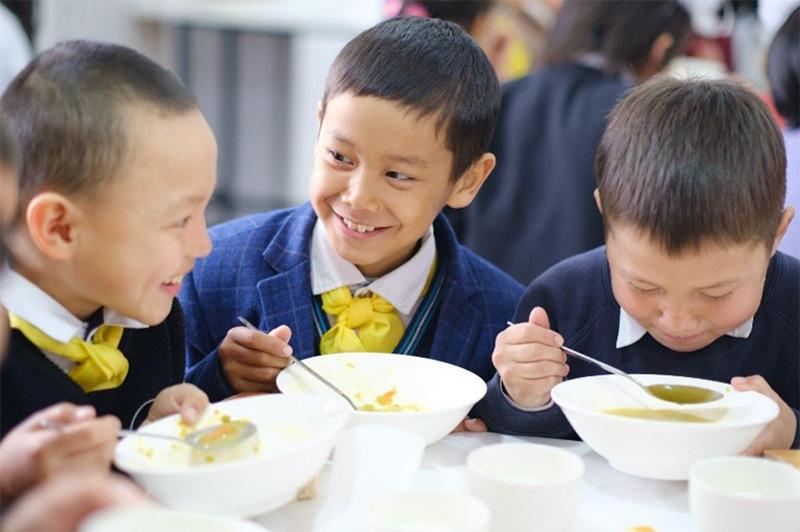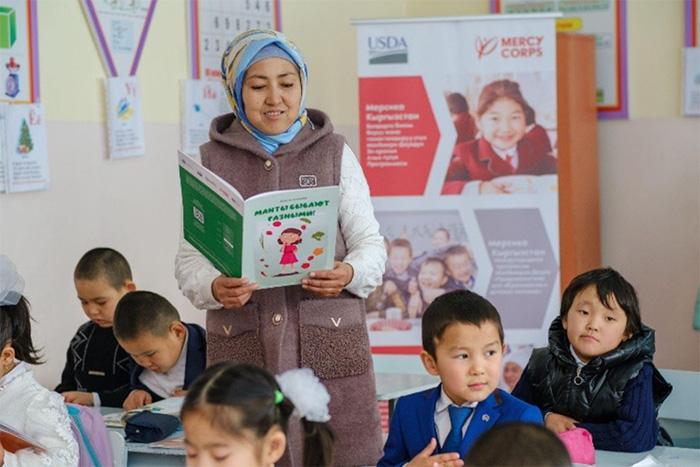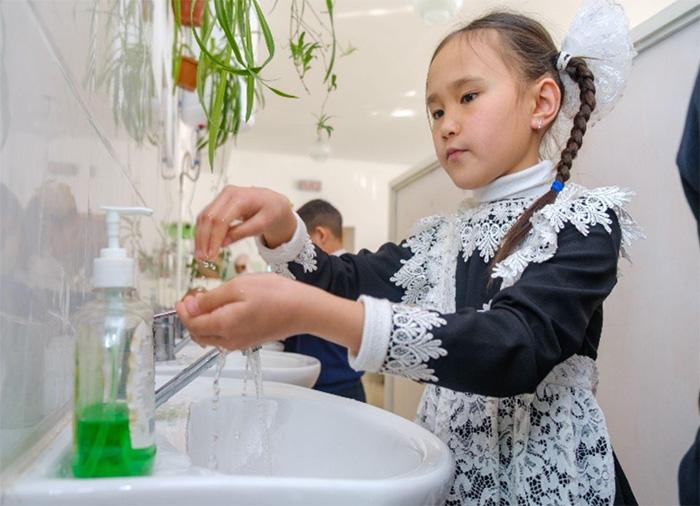
McGovern-Dole Success Story: Kyrgyzstan

In FY 2021, USDA awarded Mercy Corps $25 million to implement a five-year McGovern-Dole project to build on the successes of previous awards. The project improves access to, and the quality of, education for 80,000 students in over 400 primary schools. USDA has been providing school feeding assistance to Kyrgyzstan since 2012 for a total value of $52 million to date. The project has been successful in the transition from USDA support to local support for 510 schools and around 120,000 school age children.
Program objectives in Kyrgyzstan are to improve the literacy of school-age children by supplying literacy materials and school supplies and increase the skills and knowledge of teachers and school administrators through professional training and mentoring. The project also aims to increase knowledge of health, nutrition, and hygiene practices through safe food preparation, better commodity storage practices, and increased access to clean water and sanitation facilities in schools through infrastructure improvement. Due to the various efforts, the project increases student attendance and reduces short term hunger by providing daily school meals and increasing dietary diversity through establishing school gardens and procuring locally produced commodities. The project is also able to strengthen local market systems through procurement of locally produced commodities and linking program schools to local producers. The project supports studies related to child nutrition and school feeding and contributes to regulatory framework revisions and development in the country. Lastly, the project improves policy and regulatory framework through the training of government officials and school administrators on key issues of nutrition, school feeding, literacy, and health.
Program activities focus on literacy, attentiveness, and attendance by providing a daily school meal, training teachers and librarians in skills for promoting literacy and reading, providing school and public libraries with quality reading materials, promoting age-appropriate reading materials, and training school administrators through a mentoring app to support teachers. The project also focuses on health and dietary practices by increasing knowledge of nutrition, health, and hygiene practices, providing kitchens with requisite equipment, providing access to clean water and sanitation service, establishing school gardens and training community members in gardening and nutrition, certifying cooks with state certifications for safe, healthy food preparation and storage, and procuring kefir from local producers.

The McGovern-Dole project provides complex assistance to schools and local governments in launching school feeding programs while ensuring sustainability and transition. During FY 2021 to FY 2023, Mercy Corps collaborated with the Ministries of Education and Science and Health and other government agencies to support over 44,000 students with daily school meals, books, school orchards and improved water and sanitation infrastructure. Research Triangle Institute, the program’s subgrantee in literacy activities, trained 522 teachers and librarians on students’ five basic reading skills and 313 school administrators on lesson monitoring and quality control using a special SabakApp application. The Research Triangle Institute has also distributed over 69,000 books to target schools and public libraries and held several summer camps to promote reading habits at home among communities.
To ensure successful and sustainable school feeding implementation, Mercy Corps supported 257 schools in kitchen rehabilitation and delivered kitchen equipment amounting to $950,000. Since financial conditions remain challenging in rural areas, the project has worked individually with local governments and schools to increase the fundraising capacity of school administrations. Additionally, 117 projects on the improvement of water access and sanitary conditions were implemented within the McGovern-Dole project; some projects allowed access to water for the whole village or area.
This funding brought more innovations into school feeding implementation. In 2021-2023, 222 school cooks were trained in safe, healthy food preparation and storage topics. To improve training processes and to address cook turnover, the project has developed the first Digital Cooking course in Kyrgyzstan. School cooks also receive 50 kg of fortified flour, 50 kg of fortified rice, 25 kg of lentils, 25 kg of green split peas, and four liters of sunflower seed oil in take-home rations twice a year. Additionally, 31 schools established school orchards. The program’s second subgrantee, AgriLife, has adapted the existing Junior Master Gardener curriculum for the Kyrgyz context, ensuring the lessons include food that is relevant to the region, gardening techniques relevant to the climate and environment, culturally relevant graphics, and accurate translations. The curriculum will focus on gardening, plant science, and nutrition-related topics and will be approved by Kyrgyz Education Academy. Based on this curriculum, 40 master trainers will be trained, 31 schools’ initiative groups will attend training sessions, and 1,600 primary grade students will be trained in summer camps. This curriculum will be transferred to Kyrgyz Teacher Training Institute for sustainability.

To support all the described activities, spread key program messages and increase knowledge about nutrition, health, and sanitation topics among program communities, the Social Behavior Change component started implementation in FY 2022. Based on the formative assessment results, the main topics of trainings were determined. The activities include direct work with communities through change agents and health workers. In 2023, the project developed a mobile application for community mobilization to share materials and measure progress effectively.
To advocate for school feeding on a governmental level, Mercy Corps cooperates with ministries, parliament members, WFP school feeding programs and other stakeholders. Together with the Ministry of Education and Science and the Coalition for School Feeding Programs by development partners, Mercy Corps has contributed to the National Integration Micronutrient Anthropometric Study, the National Food Security and Nutrition Program for 2023 – 2026, and new Education law. The project has been supporting the development of the by-law on school feeding organization processes under the new Education Law. In 2023, the project started School Feeding Programs Sustainability research, which will be used in the National Sustainable School Feeding Strategy.
